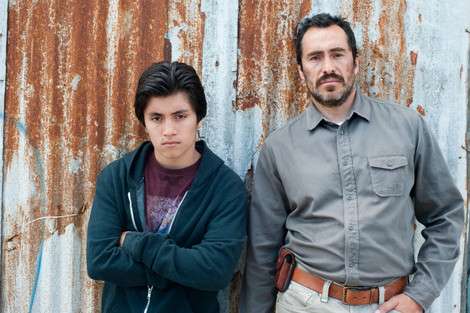 JOSE JULIAN AND DEMIAN BICHIR IN A BETTER LIFETrapped in the barrio
JOSE JULIAN AND DEMIAN BICHIR IN A BETTER LIFETrapped in the barrioThe plight, dilemma, tragedy -- all words apply -- of undocumented Latin American, particularly Mexican, workers in the United States is an enormously important subject, one that Americans and Washington need to confront. Chris Weitz (of such wide-ranging titles as
About a Boy,
The Golden Compass, and
The Twilight Saga: New Moon) has made a socially-conscious, humanistic film about an illegal Mexican man long resident in Los Angeles whose dream is simply to guide his 14-year-old toward the "better life" of the title, allow him to be whatever he wants to be. Both Demián Bichir, who plays the single father, Carlos Galindo, and José Julián, who is Luis, his American-born son, are fine actors who bring soulfulness and appeal to their roles. The trouble is in the screenplay (by Eric Eason, from a story by Roger L. Simon), which is both too focused and not specific enough, and which trails off at the end, leaving things unresolved. This in spite of some involving action and a strong sense of the Los Angeles Mexican American situation, the struggle of undocumented day workers, and, particularly, the temptations and distractions for a teenager forced to go to a bad school where gangs and drugs are the daily offerings. These barrio gang aspects are realistically sketched in up to a point, if not in the kind of vivid detail one got in, for example, Fukunaga's
Sin Nombre.
Relying on a
Bicycle Thief-like central incident leads into excitement that only exemplifies how things are going wrong for Carlos. Through an emergency loan from his sister (Delores Heredia) Carlos buys a truck from his co-worker and friend (Joaquin Cosio), who is returning to Mexico. Carlos is full of new hopes but, in a cruel twist, the truck is stolen from him almost immediately by his co-worker for the day, a mere acquaintance, while he's climbing a very tall palm tree on a wealthy estate where he's doing gardening work. One may wonder why Carlos didn't have enough contacts among the day workers to have found someone he knew better and could better rely upon. The troubled Luis, whose disaffection with his father has changed when he's counted in on the dream of building a successful business using the truck, goes along with him on a suspenseful search for Santiago, the thief.
The film continually asserts Carlos' idealism, even naiveté. He wants to pay the day worker who leads them to Santiago the $50 he demands for providing this help; Luis thinks it extortionist. Carlos is also about to pay a man the $40 he has paid for his stolen cell phone, but Luis stops him. Luis wants to attack Santiago brutally, and Carlos insists on leaving him virtually unharmed. Miraculously, Carlos and Luis find the truck and steal it back from a guarded compound. The success of this exploit thrills Luis and seals a new intimacy and faith shared by father and son -- which are sorely tested when Carlos gets into trouble again immediately after that. The screenplay lays out its events one after another without ceremony. The film seems as naive and well-meaning, as unsubtle and doomed to failure, as Carlos. His fate is left dangling. So is Luis', though the boy has moved in with his aunt in a nicer neighborhood and entered a superior school, where we see him playing soccer, perhaps a sign of indeed being on the path, however uncertain, to that "better life."
There have been plenty of movies about Latinos struggling to get to the United States and to survive once there. One strong example is Gregory Nava's 1993
El Norte, about an arduous journey to L.A. from Central America. What marks out
A Better Life is the way it shows the constant danger of being an illegal worker. Having the truck gives Carlos a chance to be self-employed, but he has no papers and hence no driver's license. If he's stopped, the jig is up. So even this advantage of transportation puts him in a more dangerous position.
Though this film lacks the raw realism it calls for, it avoids sentimentality. Its most emotional moment comes when Luis comes to see Carlos at an ICE detainment center and Carlos answers the question "why did you have me?" However, the simple plot barely avoids obvious point-making. Though the actors are fine, Demián Bichir comes with distracting baggage. He has played Emiliano Zapata in a mini-series, and appeared as Fidel Castro in Soderbergh's two-part epic
Che. No wonder he looks browbeaten here: what a comedown! More than that, and perhaps more recently and notably, he has played the dashing, dangerous, outrageous Esteban Reyes, the drug lord and regal mayor of Tijuana who marries Nancy Botwin in
Weeds. Bichir does an excellent job as the noble and long-suffering if perhaps doomed Carlos Galindo, but it's hard not to wonder how he got trapped in this humiliating and quite humorless situation. One keeps expecting him to flash a handsome smile, snap his fingers, and get his bodyguard, César to come in to help him out of this fix.
A Better Life, 98min., was released June 24, 2011 in the US; July 29 is the UK release date.





